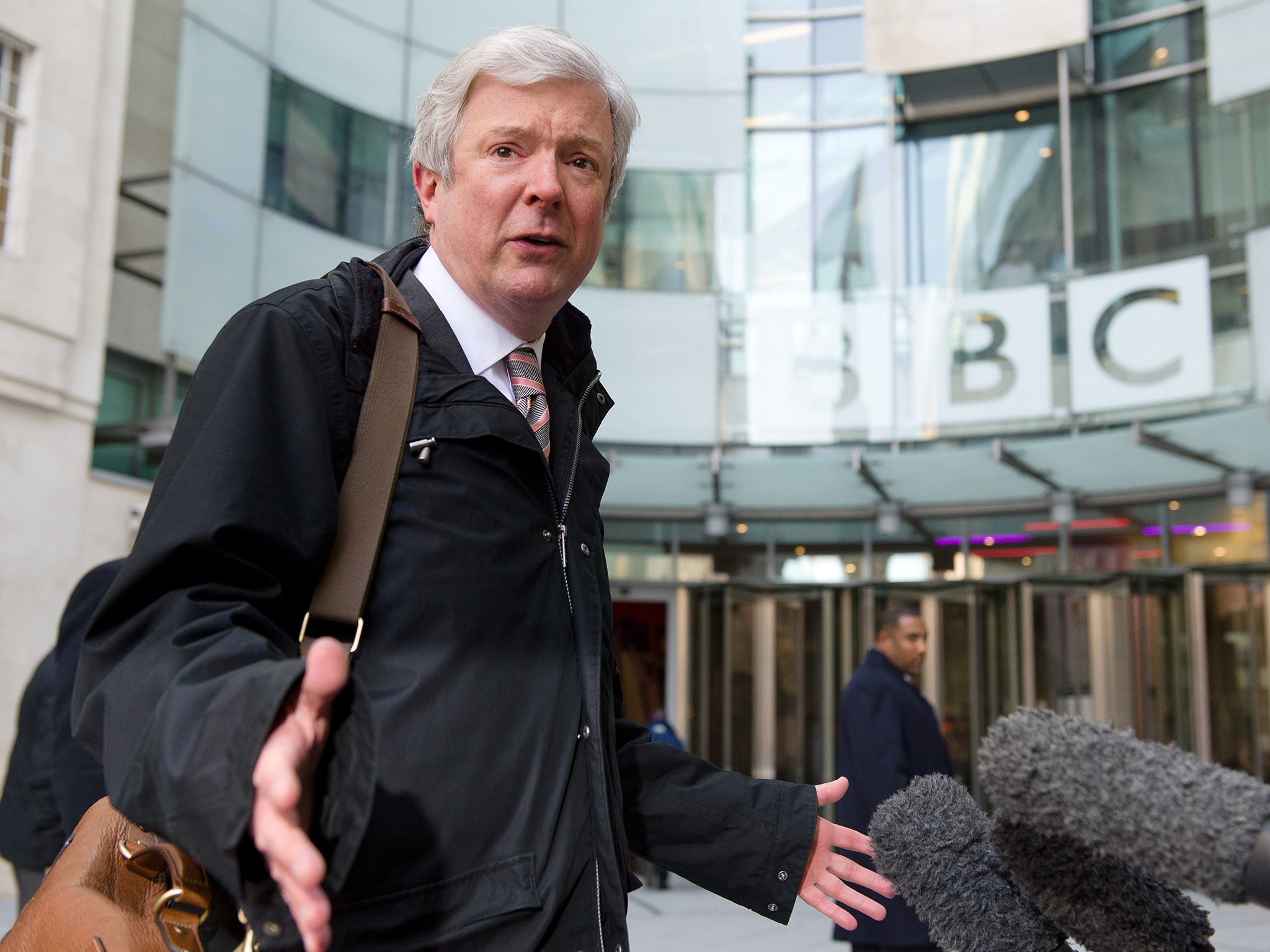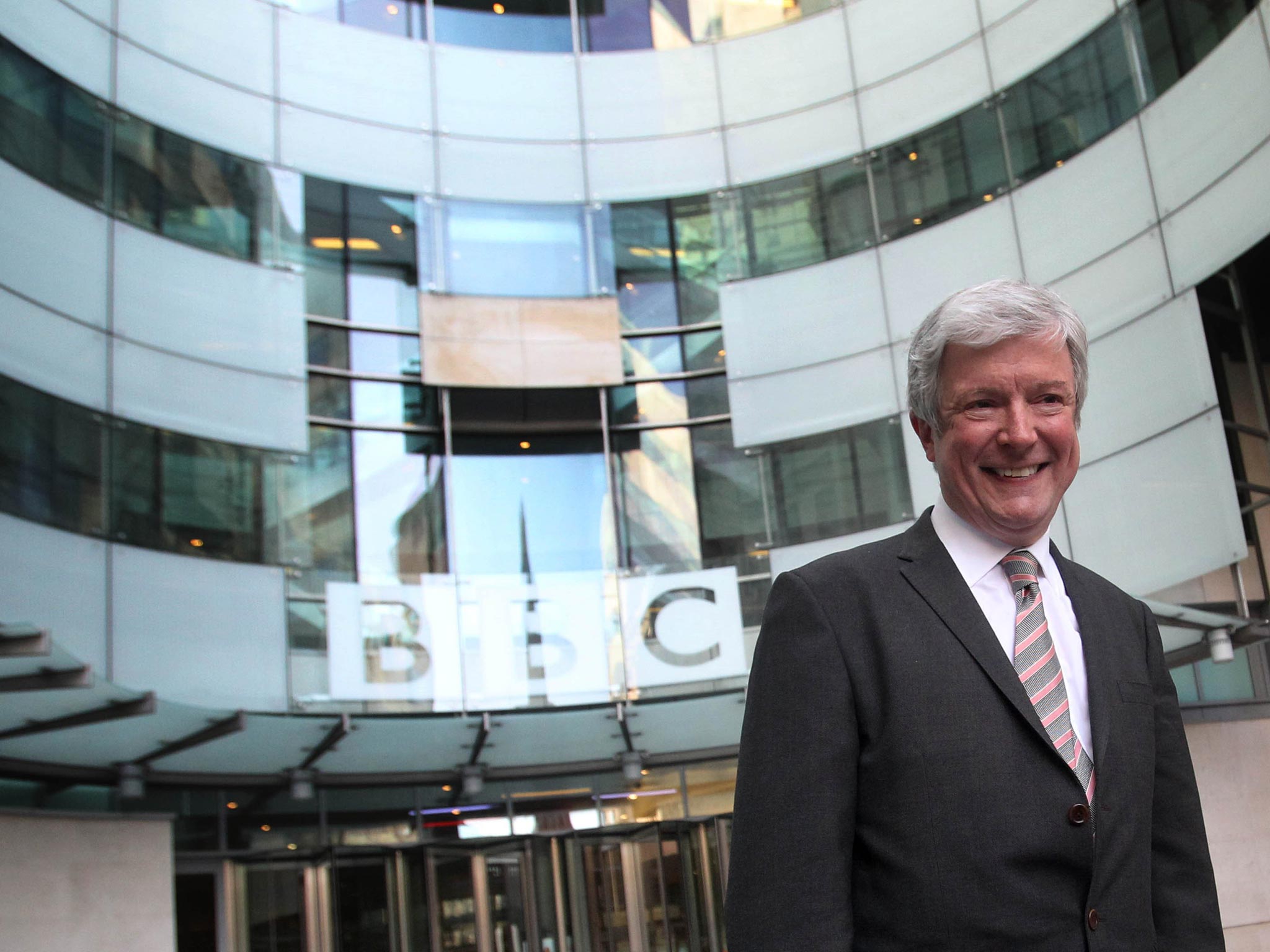Tony Hall, profile: The BBC's last, best hope who can be 'quite ruthless in getting his way'
Director-General is in the fight of his life with the Government over the future of public broadcasting

Just before he became Director-General of the BBC in 2013, I had lunch with Tony Hall at the Royal Opera House. Beforehand we watched an opera rehearsal together. Running the ROH was not just a job for him; it was also a passion. And he had transformed the place and its fortunes in his 10-year tenure.
Over lunch we discussed his aims at the BBC. He talked about the arts and how he would make coverage a bigger priority, chatting with his usual mixture of easy-going charm, friendliness and passionate intensity, his voice rising without his realising, his body moving and his hands occasionally clapping likewise. He even set a date for a future lunch when we could compare notes on just how much had been achieved. Well, two years is a long time in television.
Indeed, the couple of months since the general election have been a long time for the BBC. Hall’s priorities will have changed dramatically. The new Culture Secretary is no lover of the corporation, has queried the BBC running “commercial” programmes such as The Voice and Strictly Come Dancing, and has appointed a panel of advisers on the BBC who can be argued to have their own agendas.
Then, two days ago a Green Paper was published that envisages a smaller BBC without its governing body. And even before that, the Government decided that it would no longer fund free licences for the over-75s. The BBC itself would have to do it, which meant a huge loss of revenue. Hall agreed in a deal that safeguarded the future, short term at least, of the licence fee. For that he has received criticism, inside and outside the corporation.

Criticism! That must feel mighty strange for him. He was never the object of negativity in his time at Covent Garden, or as the chair of the successful Cultural Olympiad to run alongside the Olympic Games, or as the spectacularly successful head of news in his first stint at the BBC, or in his time until now as Director-General. The man with the Midas touch must be feeling beleaguered. Someone used to leaving glittering legacies must be asking himself whether this time it will be one that would have Lord Reith turning in his grave.
Tony Hall was born in 1951 to an Anglican family in Birkenhead on Merseyside; his father was a bank manager. His birthplace is worth mentioning, because being a northerner informs his thinking and his conversation still. He has written a book on the history of the National Union of Mineworkers. At the Royal Opera House, he instigated the hugely successful screenings of opera and ballet in multiplexes across the country, because he understood the disaffection that people outside London felt about the money going to the ROH, and in which they had no share. “I am from the North so I feel this strongly,” he told me at the time. Created a life peer in 2010, he is now Lord Hall of Birkenhead.
After attending two direct-grant schools, he went to Keble College, Oxford to read philosophy, politics and economics, joining the BBC as a trainee in 1973. Colleagues from then and now speak about his innate decency and desire to engage with colleagues at all levels. Even now as DG he is known to startle junior staff by wandering the corridors and chatting to them about their jobs.

Hall became head of news and current affairs in 1990 and created much of the news broadcasting landscape we have now. A strong CV shows that he launched BBC News 24, BBC News Online, BBC Parliament and Radio 5 Live. He was unable to prevent Panorama from being moved to a graveyard slot, but he did make one further, lasting change. He was charged with increasing the representation of ethnic minorities on screen and became the corporation’s self-styled “race champion”.
Not surprisingly, he was many people’s favourite to be the new director-general after the millennium, but lost out to Greg Dyke. He decided to follow his passion and run the Royal Opera House, to the surprise of many, including, it is said, his wife Cynthia, a former president of the Girls’ Schools Association, and headteacher of St Helen and St Katharine girls’ school in Abingdon then Wycombe Abbey girls’ school, before latterly becoming a headhunter. She was even accorded a brief eulogy in Tatler magazine in a profile of Wycombe Abbey school. Lady Hall, it said, was “superb, very grounded, quality intellect, calm in a crisis”. They could easily roll out the same description for her husband. The power couple have two grown-up children and a retreat in Tuscany.
At Covent Garden, it was power with vision for Hall. He turned a crisis-ridden institution into a success story, increasing turnover from £45m to £106m, introducing £10 tickets for students, and filling every seat with Sun readers for a performance of Don Giovanni.
He undoubtedly would have stayed at the Royal Opera House but an offer from the then BBC chairman Lord Patten to replace George Entwistle as DG in the wake of the Jimmy Savile crisis was one he could not refuse. His return delighted the troops, especially the senior officers. David Dimbleby remarked: “I feel like I’m serving in the Royal Navy when the message came in ‘Winston is back’.”
But while there was plenty to cheer his admirers, there were also things to perplex them. He rapidly surrounded himself with cronies, some of them from the management team of the Cultural Olympiad, giving them top jobs at the BBC and not advertising the posts. The former chief executive of the Cultural Olympiad Ruth Mackenzie was brought in to head the BBC’s digital arts operation The Space; the former editor of The Times James Harding became head of news, former Labour Cabinet minister James Purnell head of strategy. A public corporation should surely have advertised the jobs – not that the director-general’s was advertised when Hall took it on.
One friend says: “Look, make no mistake. Beneath the charm and the way he is attentive and sympathetic to everyone, he can be quite ruthless in getting his way.” A Royal Opera House source adds that again despite that exterior charm, he was feared at Covent Garden as he made it his business to know what was going on in every department.
Media news
Charm or not, there was one hiccup recently when he decided not to renew Jeremy Clarkson’s contract after the Top Gear fracas, a decision that led to him receiving death threats. He and his wife had to be given police protection. But even that must now seem a blip compared with the current problems.
And perhaps that is why we are suddenly seeing a new Hall. No, he won’t give up his charm or his passions. (Just the other week in the middle of the crisis, he found time to go to Longborough country-house opera in the Cotswolds to watch Wagner’s Tristan und Isolde). But we are getting a publicly assertive director-general.
Friends and BBC staff were surprised when a few days ago he reacted to government scepticism about The Voice and Strictly by saying: “The last time politicians got creative, we ended up with the Millennium Dome.” This provocative and public rebuke was a different approach from the man known as a conciliator. But he must now be all too aware that the rules of the game have changed. He has to fight fire with fire, and fight for the very existence of the BBC as we know it.
Tony Hall: A life in brief
Born: 3 March 1951, Birkenhead, Merseyside.
Family: His father was a bank manager. Married to Cynthia Hall, a headhunter. They have two children.
Education: Philosophy, politics and economics MA at Keble College, Oxford.
Career: Joined the BBC as a news trainee in 1973 rising to be head of current affairs in 1996. Named Royal Opera House chief executive in April 2001. Created a life peer in 2010. Appointed BBC Director-General in 2012.
Join our commenting forum
Join thought-provoking conversations, follow other Independent readers and see their replies
Comments
Bookmark popover
Removed from bookmarks